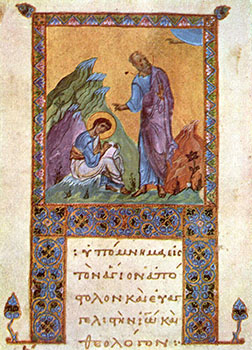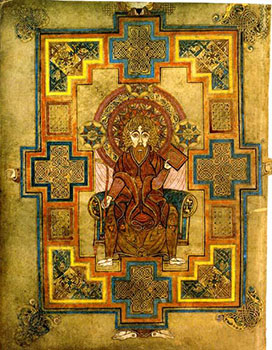From Our Archives
Debie Thomas, Bread to Carry (2021); Debie Thomas, Journeying Bread (2018).
For Sunday August 11, 2024
Lectionary Readings (Revised Common Lectionary, Year B)
Psalm 130 or Psalm 34:1–8
Ephesians 4:25–5:2
John 6:35, 41–51
This Week's Essay
A few weeks ago my wife and I went to a musical called The Ballad of Johnny and June. Johnny Cash and June Carter Cash were arguably the most famous couple in country music in their day. Their very public marriage lasted an improbable forty-seven years. As expected, the familiar music was fantastic. What I didn't expect was how the musical emphasized such an unvarnished story about the resilient love shared by two deeply troubled people.
Johnny and June exemplified the saying that behind every great man there's often a trail of human wreckage. Their son John Carter Cash co-operated with the musical precisely because he wanted to honor his parents by moving beyond the fairy tale falsehoods, and by telling the truth. "My mom didn’t save my dad, that is a myth, the problems continued," he says.
 |
|
Armenian icon of the Apostle and Evangelist John the Theologian, 13th century by the Armenian manuscript illuminator Toros Roslin.
|
“Everything in the play that is touchy or whatever is something that my father and my mother were willing to talk about. They weren’t afraid to let their struggles be known, especially if it could help other people. I knew the play would show their hardships, but it’s important to me that it also shows the forgiveness and joy and enduring love that my parents had, and the fact that they stayed together, no matter what they went through,” he added.
Love, says their famous song Ring of Fire, is a burning thing.
Walk in love, says Ephesians 5:2 for this week. Or as some translations put it, live a life of love. Every person is created in the image of God, and when we walk in love we become "imitators of God" (5:1). Paul has already written about the infinite dimensions of God's love for us — its breadth and length and height and depth that surpasses human comprehension (3:18). And now he urges us to love each other with that same love that we have received from God himself.
There's a necessary connection between claiming to love God, and claiming to have experienced his love, and demonstrating that we love our neighbor. This reciprocity of receiving God's love and then extending it to others was so embedded in the early Christian traditions that we find this teaching repeated almost verbatim at least seven times.
 |
|
Lamentation of the Virgin. John the Apostle trying to console Mary, 1435.
|
In Romans 13:8–9 and Galatians 5:14 Paul writes: "Let no debt remain outstanding, except the continuing debt to love one another, for he who loves his neighbor has fulfilled the law." The entire Old Testament law, says Paul, "may be summed up in this one rule: 'Love your neighbor as yourself.'"
In Galatians 5:6–7 he says that "the only thing that counts is faith expressing itself in love. The entire law is summed up in a single command: 'Love your neighbor as yourself.'"
James 2:8 repeats this message almost verbatim: "If you really keep the royal law found in Scripture, 'Love your neighbor as yourself,' you are doing right."
In 1 Corinthians 13 Paul wrote that the "greatest gift" is love, without which we are merely a noisy nuisance.
And then there's John, who spent his latter years at Ephesus, the recipient of the epistle for this week: "If anyone says, 'I love God,' yet hates his brother, he is a liar. For anyone who does not love his brother, whom he has seen, cannot love God, whom he has not seen. And he has given us this command: Whoever loves God must also love his brother." (1 John 4:20–21).
Loving your neighbor, Jesus said, is the greatest commandment. In his last words to his disciples, Jesus called this a new commandment. "Love one another. As I have loved you, so you must love one another. All people will know that you are my disciples if you love one another." God's presence in the world is mediated through the love of his people.
 |
|
Byzantine illumination depicting John dictating to his disciple, Prochorus (c. 1100).
|
Just as this ancient commandment was repeated throughout the New Testament, it was repeated in the centuries after the first believers. "Our care for the derelict and our active love," writes the African Tertullian, "have become our distinctive sign… See, they say, how they love one another and how ready they are to die for each other."
"Blessed is the one who can love all people equally," said Maximos the Confessor, "always thinking good of everyone."
In his commentary on Galatians 6:10, the church father Jerome describes how John the evangelist, author of the gospel and book of Revelation, preached at Ephesus into his nineties. Christian tradition holds that he died in Ephesus about the year 100 CE. I love imagining how John would have had a copy of the epistle to the Ephesians in his possession, and read the same texts that we're reading this week.
At that age, John was so feeble that he had to be carried into the church at Ephesus on a stretcher. Then, when he could no longer preach a normal sermon, he would lean up on one elbow. The only thing he said was, “Little children, love one another.” People would then carry him back out of the church.
This continued for weeks, says Jerome. And every week he repeated his one-sentence sermon: “Little children, love one another.”
Weary of the repetition, the congregation finally asked, "Master, why do you always say this?"
"Because," John replied, "it is the Lord's command, and if this only is done, it is enough."
As the chaplain at Yale University, William Sloan Coffin (1924–2006), pushed back against intellectual idolatry. He observed how students at Yale “thought cogito ergo sum (I think, therefore I am) was what it was all about, and Yale was encouraging them to think that." Coffin suggested a subversive counter-proposal: "I felt very deeply that it’s amo ergo sum (I love, therefore I am).”
 |
|
The Apostle John in the Book of Kells, c. 800.
|
This Latin phrase, which is actually the title of a 2002 book by the German Christina Kessler, can be translated slightly differently to make the point more radical: "I am because I love."
Or as the farmer-poet Wendell Berry put it, I only live to the extent that I love. In his book of poetry called Leavings (2012), Berry points the way for us in a short poem-prayer, which we have posted as our poem of the week.
"I know that I have life
only insofar as I have love.I have no love
except it come from Thee.Help me, please, to carry
this candle against the wind."
Weekly Prayer
Søren Kierkegaard (1813–1855)
Father in Heaven! Thou has loved us first, help us
never to forget that Thou art love so that this sure
conviction might triumph in our hearts over the seduction
of the world, over the inquietude of the soul, over the
anxiety for the future, over the fright of the past, over
the distress of the moment. But grant also that this
conviction might discipline our soul so that our heart
might remain faithful and sincere in the love which we
bear to all those whom Thou hast commanded us to
love as we love ourselves.Søren Kierkegaard was a Danish philosopher whose meditations, journals, and sermons were catalysts for the Christian existentialist movement. A large portion of his prayers in his journals have been edited by Perry D. LeFevre into a lovely edition with a detailed introduction called The Prayers of Kierkegaard (University of Chicago Press, 1956), from which this prayer has been taken.
Dan Clendenin: dan@journeywithjesus.net
Image credits: (1) Wikipedia.org; (2) Wikipedia.org; (3) Wikipedia.org; and (4) Wikipedia.org.





